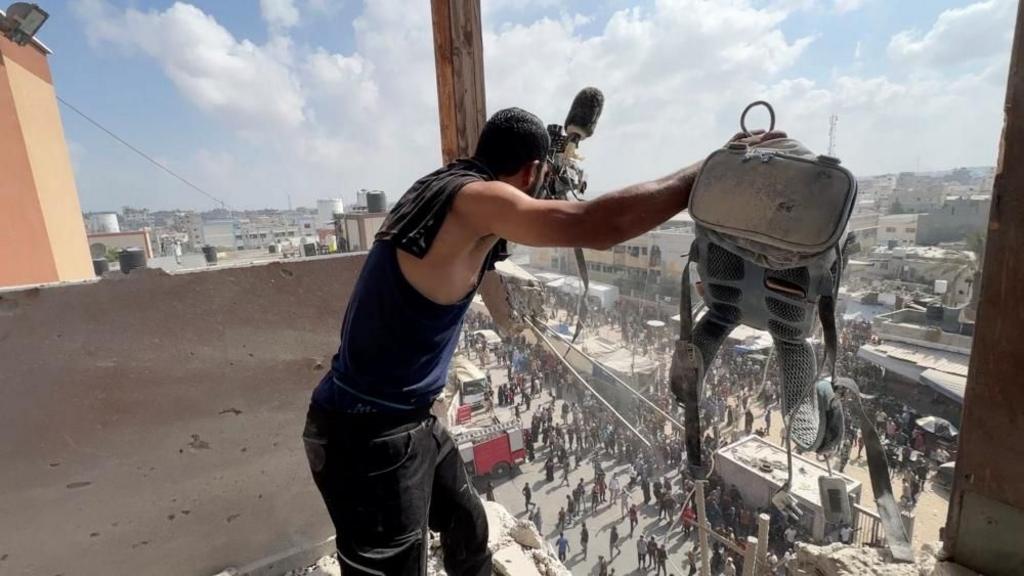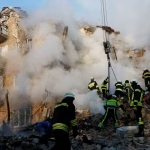In recent months, one term has repeatedly surfaced in international headlines, sparking debates in human rights circles, media outlets, and diplomatic corridors alike: the “double tap” strike. The phrase refers to a controversial military tactic that has been associated with modern conflict zones, but Israel’s reported use of it in Gaza and other Palestinian territories has reignited global outrage. Critics say it amounts to a deliberate assault on civilian life and humanitarian workers. Supporters, however, defend it as a military strategy against insurgents.
- What Is a Double Tap?
- Historical Roots of the Double Tap Tactic
- Israel and the Double Tap Allegations
- Why the Double Tap Sparks Global Outrage
- The Human Cost: Stories From the Ground
- Israel’s Defense: The Counter-Arguments
- International Reactions
- The Broader Debate: Modern Warfare and Morality
- Looking Ahead: Calls for Accountability
- FAQs
- Conclusion:
So what exactly is a double tap? Why does the mere mention of it evoke such heated moral, legal, and humanitarian debates? And how has Israel’s alleged use of this tactic changed the global conversation about modern warfare?
This article explores the concept of double taps, the historical precedents behind them, the allegations directed at Israel, and why the tactic has ignited such intense condemnation worldwide.
What Is a Double Tap?
A double tap strike is a military tactic where an area is bombed or attacked once, followed by a second strike on the same location minutes later. The first strike is intended to hit the initial target, while the second strike often hits rescuers, paramedics, journalists, or civilians rushing to help victims.
Human rights groups argue that this tactic is not only inhumane but may also constitute a war crime, since it deliberately targets those providing aid. The Geneva Conventions explicitly prohibit attacks on medical personnel and civilians. Yet, the double tap has been reported in several modern wars—from drone operations in Pakistan and Yemen to alleged Israeli strikes in Gaza.
Historical Roots of the Double Tap Tactic
The double tap is not an entirely new phenomenon. Military historians note that variations of the tactic date back to the Vietnam War and even earlier in guerrilla warfare strategies. However, the phrase became widely recognized during the U.S. drone campaign in the Middle East and South Asia.
According to a 2013 report by human rights organizations, U.S. drone strikes in Pakistan often followed a double-tap pattern, sparking criticism from both local communities and international watchdogs. At the time, researchers documented that villagers and paramedics were frequently caught in the second strike, instilling a climate of fear.
By adopting similar strategies, critics argue, Israel is not only repeating history but amplifying its brutality in one of the most densely populated regions on earth—Gaza.
Israel and the Double Tap Allegations
The accusations against Israel revolve around its air campaigns in Gaza, particularly during escalations with Hamas. Eyewitnesses, aid groups, and journalists have claimed that Israeli jets or drones sometimes launch follow-up strikes after the first bombing, hitting those rushing to provide assistance.
For instance, several humanitarian groups operating in Gaza reported cases where ambulances, medical teams, and journalists were struck shortly after arriving at scenes of initial bombings. While Israel denies intentionally targeting civilians, the repeated reports have fueled international suspicion.
The tactic’s application in Gaza has been especially controversial due to:
High population density – Gaza is one of the most crowded places in the world, making civilian casualties almost unavoidable in repeated strikes.
Restricted humanitarian access – With limited borders open, medical workers have little room to maneuver. Targeting them—or being perceived to—creates a humanitarian catastrophe.
Media visibility – Unlike remote tribal regions in Pakistan or Yemen, Gaza’s conflicts are closely covered by international media, amplifying outrage.
Why the Double Tap Sparks Global Outrage
The outrage surrounding Israel’s alleged use of the double tap stems from ethical, legal, and humanitarian concerns.
Targeting Rescuers
Perhaps the most morally disturbing aspect is that the second strike often appears to hit those trying to save lives. This undermines the principle of humanity in warfare.
Violation of International Law
Legal experts argue that double taps can constitute grave breaches of the Geneva Conventions, particularly Articles protecting civilians and medical personnel.
Impact on Journalists
Journalists rushing to cover the aftermath of airstrikes have reportedly been among the victims of second strikes. This not only endangers press freedom but also suppresses documentation of war crimes.
Fear Among Civilians
Even when not directly targeted, the perception of double taps creates widespread terror. Civilians hesitate to rescue neighbors or provide assistance, knowing they could be struck again.
Reputation Damage
Israel, already under scrutiny for its military campaigns, faces severe reputational damage. Accusations of using tactics seen as cruel and inhumane harden global criticism.
Fueling Radicalization
Observers note that such tactics, rather than eliminating insurgents, may deepen resentment and fuel further cycles of violence.
Diplomatic Fallout
Governments and international organizations have raised concerns, with some calling for investigations. This complicates Israel’s foreign relations and sparks heated debates at the United Nations.
The Human Cost: Stories From the Ground
Behind the statistics are heartbreaking stories of families torn apart. Aid workers in Gaza recount scenarios where entire households were wiped out, and survivors trapped under rubble were left to suffer longer because rescuers feared a second strike.
In one widely reported case, a paramedic crew that arrived at the scene of an initial strike was hit minutes later, leaving several dead. A local doctor described the tactic as “an attack on humanity itself.”
Journalists too have been caught in the crossfire. Reporters Without Borders has repeatedly condemned strikes on media workers, noting that double taps create an environment where documenting the truth becomes nearly impossible.
Israel’s Defense: The Counter-Arguments
Israel denies deliberately employing double taps against civilians. Officials argue that:
Hamas and other militant groups often use civilian areas as shields, making secondary strikes necessary.
The second strike may be aimed at additional militants arriving at the scene.
Israel conducts internal investigations to ensure its forces act within the law.
Pro-Israel commentators argue that critics are oversimplifying a complex battlefield reality. However, skeptics note that Israel has faced repeated allegations of excessive force, with few accountability measures.
International Reactions
The double tap issue has sparked reactions worldwide:
United Nations officials have called for independent investigations, citing possible war crimes.
Human Rights Watch and Amnesty International have condemned the tactic as cruel and unlawful.
Foreign governments, particularly in Europe and the Global South, have voiced growing frustration over what they see as Israel’s disregard for humanitarian law.
Even in the United States—Israel’s closest ally—debates have emerged within Congress, with some lawmakers pressing for stricter oversight of U.S. military aid.
The Broader Debate: Modern Warfare and Morality
The controversy over double taps highlights a broader dilemma in modern warfare. With drones, precision missiles, and rapid surveillance, militaries can strike repeatedly in short timeframes. But does technological capacity justify moral shortcuts?
Experts argue that war today is no longer just about defeating enemies—it is about upholding international norms that prevent conflicts from spiraling into outright atrocities. The double tap, critics say, erodes these norms.
Looking Ahead: Calls for Accountability
As calls for war crime investigations grow louder, Israel faces pressure to either abandon such tactics or face escalating international isolation. Meanwhile, Palestinians trapped under bombardment continue to bear the immediate cost.
The global debate over the double tap raises urgent questions: Can military necessity ever justify striking rescuers? How much evidence is needed before international courts intervene? And will world powers act, or will condemnation remain rhetorical?
FAQs
What does “double tap” mean in military terms?
It refers to a strategy of striking a target once, then striking the same location again shortly afterward, often hitting rescuers or bystanders.
Is the double tap tactic legal under international law?
Most experts say no. International humanitarian law prohibits targeting civilians, medical personnel, and journalists, making double taps potentially a war crime.
Has Israel admitted to using double taps?
Israel denies deliberately using the tactic against civilians, though humanitarian groups and witnesses allege otherwise.
Where else has the double tap been used?
The tactic was widely reported during U.S. drone campaigns in Pakistan, Yemen, and Afghanistan.
Why does the double tap cause global outrage?
Because it is perceived as targeting those who are trying to save lives, violating basic principles of humanity and international law.
Conclusion:
The outrage over Israel’s alleged use of double taps is not just about one country or one conflict. It reflects humanity’s ongoing struggle to balance military strategy with moral responsibility. At its core, the tactic asks whether rescuers, medics, and journalists—symbols of hope and survival—should ever be treated as fair game in war.
History suggests that such tactics rarely bring long-term security; instead, they deepen wounds and fuel further conflict. Whether or not Israel changes its approach, the double tap debate will continue to shape the global conversation on the ethics of modern warfare.








